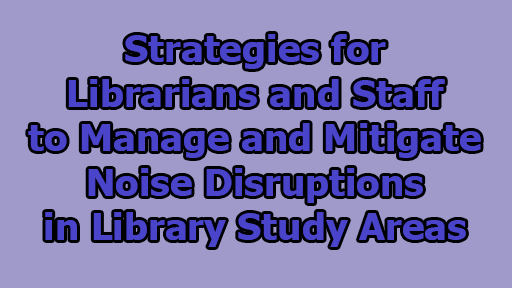Strategies for Librarians and Staff to Manage and Mitigate Noise Disruptions in Library Study Areas:
Libraries serve as sanctuaries for quiet study and research. However, maintaining silence in study areas can be challenging due to users who unintentionally or deliberately create noise disturbances. In this article, we will explore effective strategies for librarians and staff to manage and mitigate noise disruptions in library study Areas.

1. Understanding Noise Disruptions: Before addressing solutions, it’s crucial to understand the sources and types of noise disruptions in libraries. Noise can arise from various activities such as group discussions, phone calls, electronic devices, movements, or external factors like construction, traffic, or neighboring events. Furthermore, individuals have different thresholds for tolerating noise, making it essential to strike a balance that accommodates diverse needs.
2. Creating a Quiet Zone: Designating specific areas within the library as “Quiet Zones” can be an effective strategy. These zones should be clearly marked and enforced by library staff. This communicates a clear expectation of silence and provides users seeking quiet study spaces a dedicated area where noise disruptions are minimized.
3. Education and Awareness: Educating library users about the importance of maintaining a quiet environment can foster a culture of respect for others’ study needs. This can be done through signage, orientation sessions, and informational materials that highlight the significance of silence in designated study areas.
4. Policy Development and Enforcement: Developing and enforcing library policies regarding noise levels is essential. Clearly articulated rules and consequences for violating noise guidelines can deter disruptive behavior. Staff training programs should emphasize the importance of consistent enforcement while also emphasizing respectful communication with users.
5. Technology Solutions: Implementing technology-based solutions can aid in noise control. This includes using sound-masking systems, installing noise-reducing materials, or employing white noise machines to create a more serene environment. Additionally, utilizing library management systems to monitor noise levels and identify areas prone to disturbances can assist in proactive management.
6. Collaboration with Users: Engaging with library patrons to gather feedback on noise-related issues can be beneficial. Surveys or focus groups can provide insights into user preferences and suggestions for improving the study environment. Collaborating with student groups or academic institutions can foster a sense of shared responsibility in maintaining a conducive study atmosphere.
7. Alternative Spaces: Offering alternative spaces within the library for collaborative work or activities that generate noise can help channel such activities away from quiet study areas. Designating separate zones for group discussions or providing soundproof rooms can accommodate diverse user needs without compromising the tranquility of the main study areas.
8. Community Engagement and Support: Engaging with the broader community, including neighboring businesses, institutions, and local authorities, can address external noise sources that impact the library environment. Collaborating on noise reduction initiatives or coordinating schedules for activities that may cause disturbances can contribute to a quieter study atmosphere.
9. Continuous Evaluation and Adaptation: Regular assessment of noise management strategies is essential. Analyzing user feedback, monitoring noise levels, and evaluating the effectiveness of implemented measures allow for adjustments and improvements over time.
In conclusion, managing noise disruptions in library study areas requires a multifaceted approach that involves policy development, technology integration, community engagement, and continuous evaluation. By employing a combination of strategies tailored to the library’s specific needs and user expectations, librarians and staff can create an environment conducive to quiet study while accommodating diverse user requirements.

Library Lecturer at Nurul Amin Degree College









